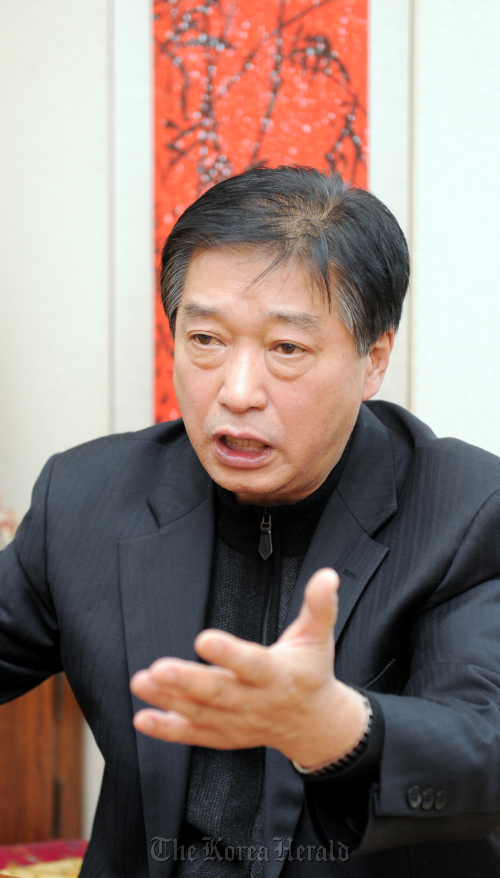Since the establishment of the Overseas Korean Institution, his achievements include the revision of the Constitution in 1980. Section 2 in Article 2 of the Constitution was revised to add: “Enacted by law, the nation has the obligation to protect overseas Koreans.”
“When I told our government that even the North Korean constitution had a provision about overseas residents that states, ‘The Democratic People’s Republic of Korea protects overseas residents,’ the National Assembly alertly decided to revise the constitution, and they did,” he laughed.
He is also responsible for numerous policies related to the Overseas Koreans Support Law, and laid the groundwork for Korea to embrace dual citizenship for overseas Koreans.
All this makes it natural for him to be nicknamed “president of 7 million Koreans living overseas.”
He noted that overseas Koreans are an asset which could become the basis of Korean economic development if they are approached with supportive measures.
“It would be wise for the government to take this as an opportunity, as they have been stingy toward them till today,” he said.
“About 7 million Koreans live in 180 countries outside of Korea. That is 10 percent of our population, and they are spread out everywhere, unlike the Chinese, Jews or Indians who are concentrated in specific regions.
“Chinese living abroad have practically constructed another China. Jews have basically created a loyal bastion within the United States. Koreans overseas need to make loyal bastions themselves and to be able to strengthen their network,” he emphasized.
He also played an important role in setting up The World Korean Business Convention, which helps small and medium-sized businesses in Korea promote their businesses among those overseas.
“Its goal is to offer opportunities for our small firms to find a way to export their products to foreign buyers as well as with the Korean network overseas.”
During the sixth convention in June 2007, he had invited President Roh Moo-hyun to give a congratulatory speech. “For hours, I explained to him the importance of our overseas Koreans to our government’s economic competitiveness, and he came.”
After Seoul was chosen to host the 1988 Olympic Games, Korean-Japanese donated 12 billion yen to Korea for its successful hosting of the Games, he said.
He added that there was a lesson to be learned from the 1911 Chinese revolution which led to the end of the Qing dynasty and the foundation of the first republic in the Chinese history
“Chinese-Hawaiians funded the government of the first republic of China. So, they are called ‘the mother of Chinese revolution.’ Their help brought about drastic changes in policies on overseas Chinese. If you look at how much the overseas Chinese are contributing to the Chinese economy, you will know how much a government support to its overseas people could boost a country’s economy.”
“If we had not sufficiently supported our brethren living in Japan, we might have seen many Korean-Japanese sent to North Korea.
According to Lee, the North Korean government has kept themselves busy trying to invite over Korean-Japanese, and Pyongyang recently invited the South Korean nurses who went to Germany in the 1960s and 1970s to make more money and later settled there.
The pro-Pyongyang federation of Korean residents in Japan sought to send Korean-Japanese to North Korea. Until the 1980s, the federation had succeeded in sending 90,000 Korean-Japanese to North Korea, which monitored and suppressed them, moreover banning their travel back to Japan. The group has been supporting pro-Pyongyang Korean-Japanese in Japan and played a negotiation counter between Japan and North Korea, which have no diplomatic relations.
“North Koreans have been sending $50,000 in education subsidies to a Korean-Japanese, about 10 times more than the South Korean support.”
From 1959 to 1984, North Korea lured 93,340 Korean-Japanese. It has focused on educational projects and operates some 130 educational facilities from elementary schools to universities.
“For the rights and interests of our overseas Koreans, we have to allow dual citizenship like in the case in Israel,” he said.
Although his attentions were mostly turned toward the Korean-Japanese, he emphasizes that he is equally interested in overseas Koreans in other countries. “In the ‘70s, I concentrated on the two Americas ― North and Latin ― and later on, I was the first one to use such words as “Korean-Russian or Korean-Chinese communities.”
His institution publishes a magazine called “OK Times.” The magazine is mailed to all regions where overseas Koreans reside, free of charge. The publishing and mailing costs are sponsored by the Surim Cultural Foundation and with donations from overseas Koreans. The Overseas Korean Institution’s core issue is research on what the South Korean government can do to support the overseas Korean.
OK Times celebrated its 200th edition last month.
Nowadays the institute is focused on cultural education, especially for the young generation.
“They ought to know our language, they need to know their mother language, or at least know who Admiral Yi Sun-shin is, don’t you think? And this problem cannot only be solved by one party but three: the Korean government, Korean citizens and the overseas Koreans.”
“Seven million overseas Koreans need to become one; they need to feel the sense that they are part of us.”
By Hwang Jurie (
jurie777@heraldcorp.com)








